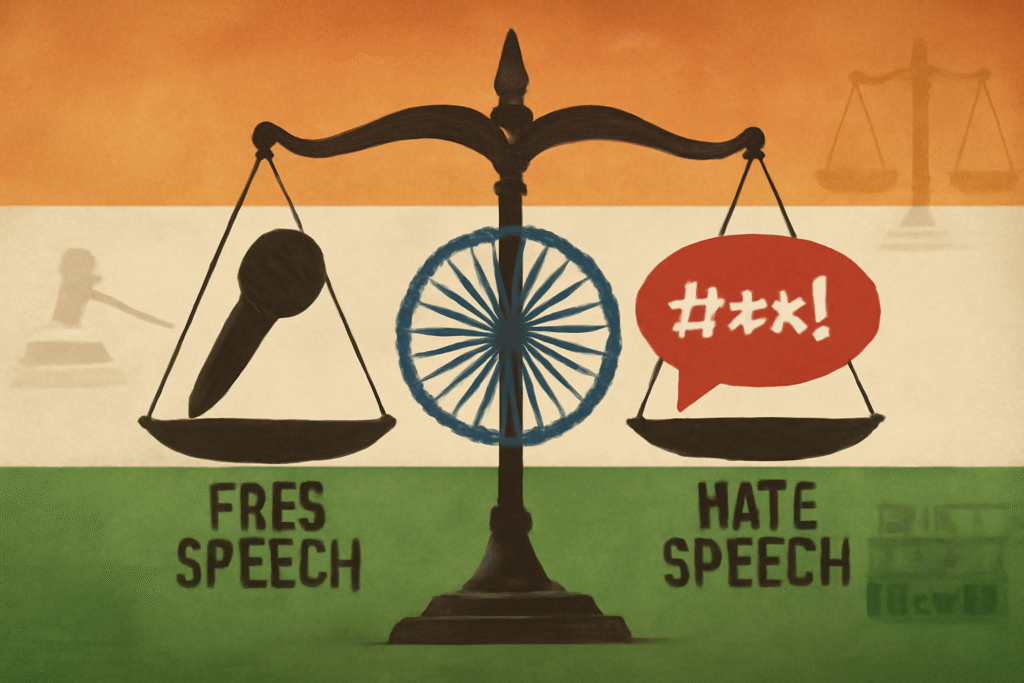Published On: September 26th 2025
Authored By: Shravani Somnath Motgi
School of Law, Mahindra University
Case Title: Amit Kumar v. Union of India
Citation: 2025 INSC 384
Court: Supreme Court
Bench: Justices J.B. Pardiwala and R. Mahadevan
Date of Judgment: March 24, 2025
Relevant Statutes/ Key Provisions:
- Section 154 and 174 of the Code of Criminal Procedure, 1973
- Section 18A of the Scheduled Castes and Scheduled Tribes (Prevention of Atrocities) Act, 1989
- SC/ST (Prevention of Atrocities) Rules, 1995
- Lalita Kumari v. State of UP
Brief Facts:
This case was instituted due to the untimely and mysterious deaths of two students studying the B.Tech courses of the Indian Institute of Technology, Delhi (IIT Delhi). The deceased, Ayush Ashna and Anil Kumar, both belonging to the Scheduled Caste community, were found dead in their hostel rooms in July and September 2023, respectively.
Ayush Ashna, an 18-year-old first-year undergraduate student pursuing the B.Tech. course at the Department of Civil Engineering, IIT Delhi, was found hanging from the ceiling fan of Room No. U-405 of Udaigiri Hostel on July 8, 2023.
As per the police panchnama, the victim was found hanging by a bedsheet, their tongue sticking out and face becoming blue, with signs of suffocation. No blood or external injury to the body was found, and the room seemed to be in its place. The bedsheet used for the hanging was tied with a complicated double knot.
However, Ayush’s family refuted the judgment that it was a suicide. They highlighted a major physical deficiency in the arrangement: Ayush stood approximately 5 feet 8 inches tall, while the table in the room was only 4 feet high.[1] The family asserted that it was physically impossible for him to have been able to commit suicide in such an arrangement, given the height of the ceiling and the fact that there was no supporting framework available to make a convincing hanging using just that table. There was no stool, chair, or any other apparatus to support.
The family also expressed concern regarding the sustained caste-based harassment, humiliation, and ostracism that Ayush allegedly received from his peers and teachers. His father explained how Ayush had reported discrimination and the pressure of studies, but, despite complaining, IIT Delhi had no effective support mechanism or redressal system.
The family had approached the police with a complaint, seeking registration of an FIR under Sections 302[2], 306[3], 504[4], and 506 of the IPC[5], and Sections 3[6] and 18A[7] of the SC/ST (Prevention of Atrocities) Act; the police, however, registered the case only under Section 174 of the CrPC[8], tagging it as an unnatural death.
Anil Kumar, 21-year-old fourth-year student of the Department of Electrical Engineering, was found hanging in Room No. V-110, Vindhyachal Hostel, IIT Delhi, on 1 September 2023.
His body was found sitting on the floor, the tail end of the bed sheet wrapped around a ventilator in a knot and the other around his neck. Rigor mortis had begun to develop, and the room was free of any signs of forced entry or struggle. The police, once again under Section 174 CrPC[9], opined that the cause of death was suicidal.
Anil’s sister, Anju, and his brother, Vikas, protested against this finding. They charged caste-based discrimination, humiliation in their academic assessment, and psychological trauma due to biased treatment by some professors. They also alleged not receiving financial or academic assistance, and faculty insensitivity to his problems. Similar to Ayush, there was no precursor suicide note.
Despite longstanding grievances by both families, FIRs were not registered by the police, but administrative inquest procedure was followed. The families claimed non-registration of FIRs is violative of mandatory procedure under Section 154 CrPC [10]and Section 18A of SC/ST Act[11], which forbids any pre-inquiry while offences against SCs are being made.
The families approached the Delhi High Court to request FIR registration and separate inquiry, which was denied, thus the appeal to the Supreme Court.
Issues:
- Whether the Police was justified in closing the matter upon conclusion of the inquiry under Section 174 of CrPC?
- Whether the recourse to inquest proceedings under Section 174 of the CrPC obviates the requirement of registration of F.I.R?
- Whether an inquest report discovering the cause of death would be good enough to close the matter without registration of an F.I.R?
Appellants Arguments:
The appellants, who had challenged the dismissal of their writ petition by the Delhi High Court, contended that their comprehensive complaints to the effect of the death of two Scheduled Caste students at IIT Delhi disclosed cognizable offences requiring mandatory registration of FIRs. But the police only conducted inquiries under Section 174 CrPC [12]and did not conduct a criminal investigation by registering FIRs. The appellants alleged that statements were falsely attributed to them and their relatives, reporting that they were compelled to sign documents without knowing the contents. They alleged the police point-blank refused to register FIRs, exhibiting bias and unwillingness to discharge their statutory obligations. Drawing heavily from the Supreme Court’s decision in Lalita Kumari v. State of U.P [13], they highlighted that the registration of an FIR is mandatory under Section 154 CrPC where information reveals a cognizable offence, and a preliminary inquiry can be conducted only under specified conditions. They also drew attention to Kirti Vashisht v. State & Ors [14], where the Court reiterated that a writ of mandamus may order police authorities to register an FIR in the case of inaction in respect of a cognizable offence. They also drew attention to Babubhai v. State of Gujarat[15] to argue that once an offence is determined to be cognizable, the police have to investigate and an inquest report cannot be a substitute for the criminal investigation. Also, the appellants further pointed out the applicability of Section 18A of the SC/ST (PoA) Act, which prohibits any preliminary inquiry prior to the registration of an FIR in cases of atrocities against the Scheduled Castes. They argued that even if the deaths were suicidal, the attendant charges of harassment in the caste context warranted inquiry into suspected abetment. Accordingly, they sought guidelines for FIR registration, CBI investigation, and judicial oversight to maintain propriety and observance of law.
Respondents Arguments:
- Respondents 2, 3, 4 and 7
Respondents 2, 3, 4, and 7, who are the Delhi Police and concerned authorities, argued that their investigation under Section 174 of the CrPC [16]was valid and adequate in the light of the facts of the two deaths. In both the cases, the police had quickly responded to PCR calls, only to find that the rooms were locked from within, and no signs of forced entry. The police found the victims hanging, and postmortem reports supported death by asphyxia due to hanging or ante-mortem compression of the neck by ligature[17]. Family members, hostel authorities, students, and faculty members were statements recorded from, several of whom deposed that the students were under great academic pressures and manifested signs of depression. No complaints of caste discrimination were said to have been made by the victims. Further, in the case of Ayush Ashna, the father is said to have reported that his son was depressed and no complaints had been made to the administration, and in the case of Anil Kumar, the brother is said to have reported that there were no suspicions regarding the cause of death. Academic grade sheets reflected a pattern of repeated failures in both the students. A look at hostel forms and allotment letters reflected a lack of any reflection of caste, and hence caste was neither recognized nor confronted by the institutional authorities.
The police thus believed that no cognizable offence had been noted, and hence an FIR was not necessary. They relied on the judgment in Sakiri Vasu v. State of Uttar Pradesh[18], arguing that if the petitioners were aggrieved by the non-registration of the FIR, they had adequate alternative remedies available under Section 156(3) CrPC [19]before the Magistrate. They argued that, based on inquest, postmortem reports, and statements of witnesses, there was no material to support registration of FIRs and therefore no basis for mandamus.
- Respondent No.5 – IIT Delhi
Respondent No. 5 at IIT Delhi reported that both student deaths had taken place under unfortunate but unconnected circumstances, some two months apart. It reported that both students had been academically weak, and their continued stay in the hostels was allowed only to enable them to clear their pending credits. In the case of Ayush Ashna, the room was found to have been locked from the inside, and when it was broken open, the student was found hanging. In the case of Anil Kumar, detection of a stench resulted in the opening of his room, where the student was found dead in a state of putrefaction.
IIT Delhi emphasized that in both cases, their families were kept in the loop and provided counseling by the institution. The institute went on to assert that neither student ever approached the SC/ST Cell nor raised any issue of caste-based harassment with any institutional authority. As part of an internal inquiry, some SC/ST students were interviewed, none of whom claimed to have faced any form of discrimination. It was made clear that information of caste or category is not available in day-to-day academic or administrative work, and access is allowed only to the Dean (Academics). IIT Delhi claimed that it has robust systems in place for the well-being of students and mental well-being, including Faculty Advisors, a Board of Student Welfare, counseling units available offline and online, and grievance redressal and anti-discrimination provisions. The institution quoted the case of P. Sirajuddin v. State of Madras[20], arguing that a preliminary inquiry is justified to avoid frivolous and baseless complaints proceeding without good reason. IIT Delhi also asserted its complete coordination with the police officials, stating that the institute’s internal probe produced no facts to support the claims of caste-based or systemic discrimination.
Judgment:
The Supreme Court set aside the Delhi High Court judgment, ruling that police breached their duty under Section 154 of the CrPC [21]by not registering FIRs for cognizable offences. It clarified that Section 174 [22]proceedings only establish the apparent cause of death and cannot replace criminal investigation, especially for serious charges like caste discrimination or incitement. The Court emphasized the obligation under Section 154 of the CrPC[23] and Section 18A of the SC/ST Act [24]to register FIRs upon violence disclosures. The police’s failure to register FIRs was deemed procedurally and legally flawed, leading to orders for FIR registration, CBI investigation, judicial supervision, and cooperation from IIT Delhi.
Ratio Decidendi
When a complaint reveals a cognizable offence, registration of an FIR is required under Section 154 CrPC[25]. The statutory mandate cannot be displaced by preliminary inquiry or inquest under Section 174 CrPC[26], much less when the offence alleged is under the SC/ST (PoA) Act, where preliminary inquiries prior to registration of the FIR are categorically ruled out under Section 18A[27]. The inquest report cannot be a substitute for full criminal investigation.
Obiter Dicta:
The Court emphasized the need for reforms in higher education to address mental health issues among marginalized students, citing student suicides among Dalit and tribal students. It called for a National Task Force to examine institutional practices contributing to student distress. Universities have a moral and constitutional duty to create secure, inclusive, and supportive environments for all students, especially marginalized groups burdened by social and psychological challenges.
Final Judgment:
The appeal was allowed, and the Delhi High Court’s 30.01.2024 order was set aside. The Supreme Court instructed the Delhi Police to file FIRs based on families’ complaints. The investigation was transferred to the CBI, with supervision for fairness. IIT Delhi was required to fully assist the inquiry, including providing documents and officials for interrogation.
References:
[1] Amit Kumar v. Union of India, 2025 INSC 384, ¶ 7 (India).
[2] § 302, Indian Penal Code, No. 45 of 1860, INDIA CODE (2023).
[3] § 306, Indian Penal Code, No. 45 of 1860, INDIA CODE (2023).
[4] § 504, Indian Penal Code, No. 45 of 1860, INDIA CODE (2023).
[5] § 506, Indian Penal Code, No. 45 of 1860, INDIA CODE (2023).
[6] § 3, Scheduled Castes and Scheduled Tribes (Prevention of Atrocities) Act, No. 33 of 1989, INDIA CODE (2023).
[7] § 18A, Scheduled Castes and Scheduled Tribes (Prevention of Atrocities) Act, No. 33 of 1989, INDIA CODE (2023).
[8] § 174, Code of Criminal Procedure, No. 2 of 1974, INDIA CODE (2023).
[9] Supra note 8
[10] § 154, Code of Criminal Procedure, No. 2 of 1974, INDIA CODE (2023).
[11] Supra note 7
[12] Supra note 8
[13] Lalita Kumari v. State of U.P., [2013] 14 S.C.R. 713 (India).
[14] Kirti Vashisht v. State & Ors., AIRONLINE 2019 DEL 1940.
[15] Babubhai v. State of Gujarat, 2011 (1) SCC (Cri) 336.
[16] Supra note 8
[17] Amit Kumar v. Union of India, 2025 INSC 384, ¶¶ 7–8 (India)
[18] Sakiri Vasu v. State of Uttar Pradesh, 2008 (1) SCC (Cri) 440
[19] § 156(3), Code of Criminal Procedure, No. 2 of 1974, INDIA CODE (2023).
[20] P. Sirajuddin v. State of Madras, AIR 1971 SC 520.
[21] Supra note 10
[22] Supra note 8
[23] Supra note 10
[24] Supra note 7
[25] Supra note 10
[26] Supra note 8
[27] Supra note 7




